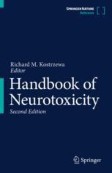Search
Search Results
-
Dose-Ranging Effects of the Intracerebral Administration of Atsttrin in Experimental Model of Parkinson’s Disease Induced by 1-Methyl-4-phenyl-1,2,3,6-tetrahydropyridine (MPTP) in Mice
Parkinson’s disease is one of the most common neurodegenerative disorders characterized by a multitude of motor and non-motor clinical symptoms...

-
Glimepiride Prevents 1-Methyl-4-Phenyl-1,2,3,6-Tetrahydropyridine Induced Dopamine Neurons Degeneration Through Attenuation of Glia Activation and Oxidative Stress in Mice
It is well established that there is a link between type 2 diabetes mellitus and Parkinson’s disease (PD) evidenced in faster progression and more...

-
Pyruvate Prevents Dopaminergic Neurodegeneration and Motor Deficits in the 1-Methyl-4-Phenyl-1,2,3,6-Tetrahydropyridine Model of Parkinson’s Disease
Parkinson’s disease (PD) is a progressive neurodegenerative disorder characterized by the selective loss of dopamine(DA)rgic neurons in the...

-
Intestinal Dopamine Receptor D2 is Required for Neuroprotection Against 1-Methyl-4-phenyl-1,2,3,6-tetrahydropyridine-induced Dopaminergic Neurodegeneration
A wealth of evidence has suggested that gastrointestinal dysfunction is associated with the onset and progression of Parkinson’s disease (PD)....

-
Whether the Subacute MPTP-Treated Mouse is as Suitable as a Classic Model of Parkinsonism
1-methyl-4-phenyl-1,2,3,6-tetrahydropyridine (MPTP) mice model is one of the most common animal models for Parkinson’s disease (PD). It is classified...

-
MPTP: Advances from an Evergreen Neurotoxin
Since its discovery in 1976, 1-methyl-4-phenyl-1,2,3,6-tetrahydropyridine (MPTP) models in rodents and nonhuman primates have continuously renewed to...
-
Purple pitanga extract (Eugenia uniflora) attenuates oxidative stress induced by MPTP
1-Methyl-4-phenyl-1,2,3,6-tetrahydropyridine (MPTP) has been widely used due to its specific and reproducible neurotoxic effect on the nigrostriatal...

-
MPTP: Advances from an Evergreen Neurotoxin
Since its discovery in 1976, 1-methyl-4-phenyl-1,2,3,6-tetrahydropyridine (MPTP) models in rodents and nonhuman primates have continuously renewed to...
-
Amelioration of Astrocyte-Mediated Neuroinflammation by EI-16004 Confers Neuroprotection in an MPTP-induced Parkinson’s Disease Model
Parkinson’s disease (PD) is a neurodegenerative disorder that results in motor impairment due to dopaminergic neuronal loss. The pathology of PD is...

-
Neuroprotective effects of GSK-343 in an in vivo model of MPTP-induced nigrostriatal degeneration
Parkinson’s disease (PD) is characterized by the degeneration of dopaminergic nigrostriatal neurons, which causes disabling motor disorders....

-
Mesenchymal stem-cell-derived microvesicles ameliorate MPTP-induced neurotoxicity in mice: a role of the gut–microbiota–brain axis
RationaleParkinson’s disease (PD) is a chronic and progressive neurodegenerative disorder. Increasing evidence suggests the role of the...

-
4-Aminopyridine Protects Nigral Dopaminergic Neurons in the MPTP Mouse Model of Parkinson’s Disease
Various pharmacological blockers targeting K + channel have been identified to be related to the treatment of Parkinson’s disease (PD). Previous...

-
Spatial lipidomics reveals brain region-specific changes of sulfatides in an experimental MPTP Parkinson’s disease primate model
Metabolism of MPTP (1-methyl-4-phenyl-1,2,3,6-tetrahydropyridine) to the neurotoxin MPP + in the brain causes permanent Parkinson’s disease-like...

-
18β-glycyrrhetinic acid ameliorates MPTP-induced neurotoxicity in mice through activation of microglial anti-inflammatory phenotype
Rationale18β-glycyrrhetinic acid (18β-GA) has been reported to have anti-inflammatory and neuroprotective effects. However, the therapeutic effect of...

-
Neuroprotection of isookanin against MPTP-induced cell death of SH-SY5Y cells via BCL2/BAX and PI3K/AKT pathways
Background and purposeIsookanin, an important antioxidant component in Coreopsis tinctoria Nutt., has shown remarkable hypolipidemic, hypoglycemic,...

-

-
Neuroprotective effect of hyperoside in MPP+/MPTP -induced dopaminergic neurodegeneration
Parkinson’s disease (PD) is a neurodegenerative disease characterized by the pathological loss of nigrostriatal dopaminergic neurons, which causes an...

-
Wuzi Yanzong Pill relieves MPTP-induced motor dysfunction and neuron loss by inhibiting NLRP3 inflammasome-mediated neuroinflammation
Parkinson disease (PD) is an age-related neurodegenerative disease, which is associated with the loss of dopaminergic neurons (DA neurons) in the...

-
Neuroprotective Activities of Long-Acting Granulocyte–Macrophage Colony-Stimulating Factor (mPDM608) in 1-Methyl-4-Phenyl-1,2,3,6-Tetrahydropyridine-Intoxicated Mice
Loss of dopaminergic neurons along the nigrostriatal axis, neuroinflammation, and peripheral immune dysfunction are the pathobiological hallmarks of...

-
Positive allosteric mGluR2 modulation with BINA alleviates dyskinesia and psychosis-like behaviours in the MPTP-lesioned marmoset
There is mounting evidence that positive allosteric modulation of metabotropic glutamate type 2 receptors (mGluR 2 ) is an efficacious approach to...

